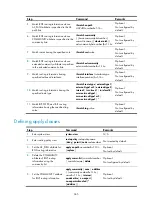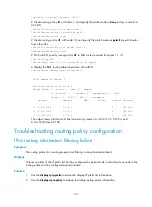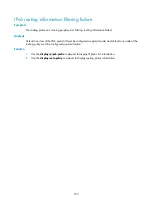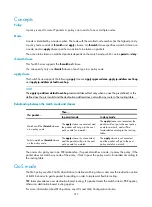
377
Concepts
Policy
A policy is used to route IP packets. A policy can consist of one or multiple nodes.
Node
A node is identified by a node number. The node with the smallest node number has the highest priority.
A policy node consists of
if-match
and
apply
clauses. An
if-match
clause specifies a match criterion on
a node, and an
apply
clause specifies an action to be taken on packets.
The action to be taken on matched packets depends on the match mode, which can be
permit
or
deny
.
if-match clause
This Switch Series supports the
if-match acl
clause.
You can specify only one
if-match
clause of each type in a policy node.
apply clause
This Switch Series supports the following
apply
clauses:
apply ip-precedence
,
apply ip-address next-hop
,
and
apply ip-address default next-hop
.
NOTE:
The
apply ip-address default next-hop
command takes effect only when no next hop is defined, or the
defined next hop is invalid and the destination address does not match any route in the routing table.
Relationship between the match mode and clauses
If a packet…
Then…
In permit mode
In deny mode
Matches all the
if-match
clauses
on a policy node
The
apply
clause is executed, and
the packet will not go to the next
policy node for a match.
The
apply
clause is not executed, the
packets will not go to the next policy
node for a match, and will be
forwarded according to the routing
table.
Fails to match an
if-match
clause
on the policy node
The
apply
clause is not executed,
and the packet will go to the next
policy node for a match.
The
apply
clause is not executed,
and the packet will go to the next
policy node for a match.
The nodes of a policy are in an OR relationship. If a packet matches a node, it passes the policy; if the
packet does not match any node of the policy, it fails to pass the policy and is forwarded according to
the routing table.
QoS mode
The QoS policy uses QoS traffic classification to define matching criteria, and uses the redirection action
of traffic behavior to guide packet forwarding in order to implement flexible routing.
PBR takes precedence over destination-based routing. If a packet meets the match criteria, PBR applies;
otherwise, destination-based routing applies.
For more information about QoS policies, see
ACL and QoS Configuration Guide
.
















































